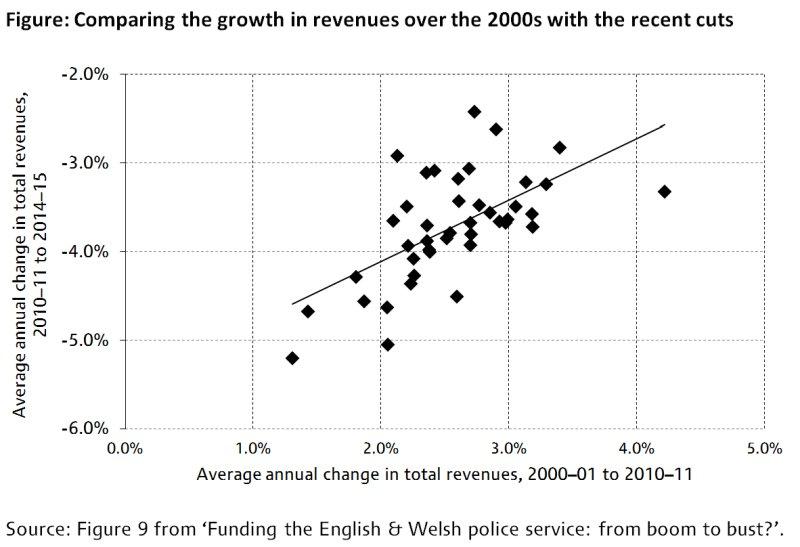Police forces have borne significant spending cuts arising from the government’s recent austerity programme. This article summarises the main findings of a new Briefing Note from the Institute for Fiscal Studies on government funding of the police since the turn of the millennium. This work, funded by the Economic and Social Research Council, provides important context for the ongoing debate surrounding the Home Office proposals to change the way central government funding for police services is distributed between forces.
As an ‘unprotected’ area of public spending (unlike the NHS, schools and overseas aid), spending on police services in England and Wales fell by 14% in real terms between 2010–11 and 2014–15. This is in marked contrast to the substantial growth of police spending over the 2000s: police spending increased by 31% in real terms between 2000–01 and 2010–11. The cuts to police spending since 2010–11 have been large enough to reduce spending per person by 2014–15 roughly back to the level it was in 2002–03.
Police forces in England and Wales are financed from two main sources: grants from central government and a component added to local council tax called the police precept. The growth in spending over the 2000s was mainly due to a near-doubling of precept revenues – shown in the table below. The cuts that followed have been driven by cuts to central government grants – which fell by a fifth. There has therefore been a shift towards local financing of the police. In 2000–01, precept revenues financed a sixth of police spending. By 2014–15, this had risen to nearly a third.

There are important differences between police forces in how they fared during the period of growth in funding and the period of cuts that followed.
The forces that saw the biggest increases in police spending over the 2000s were those that increased revenues from the precept by the most. For example, North Yorkshire Police more than tripled its precept revenues between 2000–01 and 2010–11 (and saw its overall revenues increase by more than 50%), while Northumbria Police increased precept revenues by only a third (and saw overall revenues increase by just 14%).
Since 2010–11, the cuts to police spending have been driven by cuts to grants. The coalition government applied the same percentage cut to grants to all police forces each year. However, because some forces are much more reliant on grant funding than others, the cuts to spending power varied substantially across forces. Surrey Police – which received 54% of its revenues from grants in 2010–11 – saw its revenues fall by 10% between 2010–11 and 2014–15, while Northumbria Police – which received 88% of its revenues from grants in 2010–11 – saw its revenues fall by 19%.
The scatter plot below shows, for each force, how the average annual change in funding between 2010–11 and 2014–15 compared with the average annual change in funding between 2000–01 and 2010–11. This reveals that the forces that saw the biggest cuts to spending between 2010–11 and 2014–15 also typically saw the smallest increases over the 2000s. This is because the forces most reliant on grant funding in 2010–11 were also those that increased their precept revenues least over the 2000s.

Taking the period as a whole, spending on the police (excluding the counter-terrorism grant) increased on average by 7% between 2000–01 and 2014–15, but this varied from a cut of 8% for Northumbria Police to an increase of 32% in North Yorkshire.
Why some forces increased precept revenues over the 2000s by so much more than others remains an important question. It could be that the formula central government used to allocate grants to police forces did not adequately reflect their relative needs, and so forces with greater needs needed to raise more from the precept. Or it could be that people in some areas have preferences for higher spending on the police, making it easier for these forces to raise revenue locally. Understanding these different motivations is particularly crucial for the Home Office at the moment, given it is seeking to reform how central government grant funding is allocated between forces in future.
The briefing note ‘Funding the English & Welsh police service: from boom to bust?’ was funded by the Economic and Social Research Council (grant ES/L008165/1).









